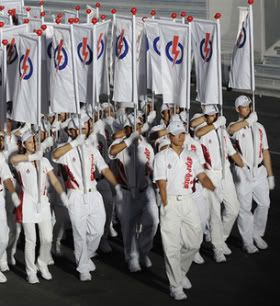Kelvin Teo
 There is a widespread belief that the ruling party will try to co-opt the talented few who constantly provide critical voices against the government’s (ruling party can be considered synonymous with government since the majority of the latter is made up members from the former) actions and policies. Some speculate that this is part of a move to limit the opposition’s ability to recruit talented candidates into its ranks, whilst at the same time retaining the PAP’s monopoly on talents.
There is a widespread belief that the ruling party will try to co-opt the talented few who constantly provide critical voices against the government’s (ruling party can be considered synonymous with government since the majority of the latter is made up members from the former) actions and policies. Some speculate that this is part of a move to limit the opposition’s ability to recruit talented candidates into its ranks, whilst at the same time retaining the PAP’s monopoly on talents.
This sentiment was echoed by the likes of Gandhi Ambalam who also felt that groups who adopted critical positions on the government are also under the threat of co-opting (or stifling). The question is – can every single critical voice be co-opted? There are two schools of thought with regards to the topic of co-opting. The first school of thought believes that it is possible to co-opt everyone, including critical voices. The second school of thought believes that only some types of critical voices can be co-opted by the ruling party, whilst others cannot be co-opted.
Admittedly, majority will subscribe to the first school of thought and only a minority will believe in the second. I happen to belong to the minority. Why only some can be co-opted whilst others cannot? Much has to do with the PAP’s history. After its initial defeat in the 1955 Elections, the PAP decided to team up with the communist faction in Singapore to attract the votes of working class Singaporeans. A split occurred years later when left-wing members of the PAP left the party to establish Barisan Sosialis. Despite Operation Coldstore leading to the arrest of Barisan’s members, it still won an admirable 13 out of 51 seats. This made Barisan a leading opposition party, and the second largest party.
Fast-forward to the modern era, it has been a one-party rule by the PAP, with a token opposition presence in the form of two seats. An interested commentator (who declined to be named) and I observed the current slate of PAP candidates in the present day, and we sort of came to the conclusion that with the exception of the old guards, the rest are not considered real politicians. When we say a candidate is a real politician, it is taken to mean that he possesses the qualities of an astute political strategist in carving out growth opportunities plus negotiating political barriers and an added ability to win support. Like all real politicians, these people have the ability to carve their own niche within the political world, and definitely have the potential to be even bigger entities than that of the PAP themselves. Thus, in all likelihood, real politicans who do not support the PAP are unlikely to be co-opted.
When my counterpart and I discussed deeper on the topic of co-opting, we even agreed that those who fit into the mold of a political strategist, especially those who are able to strategize against the PAP will probably not be co-opted. As compared with political strategists and real politicians, mere critics like some of the PAP ‘politicans’ do not pose a high-level of threat to the party itself. The risk of co-opting a political strategist, especially those who strategize against the PAP is quite high to the latter, because they will now be privy to information on the strengths and weaknesses of the PAP, and if they decide to oppose the PAP one day, they are in a better position to design a strategy against the PAP. As for real politicians, they are able to carve their own niche and muster their own support even if co-opted within the PAP camp. If one day, they decide to oppose the PAP, it can be a case of history repeating itself like what happened with the Barisan Socsialis, though it will be under different circumstances, but the scenario about influential politicians taking with them their followers and splitting from the party could repeat.
Thus, to answer the question of whether to co-opt or not, the issue is whether or not the co-opted personnel poses a risk to the PAP. Critical voices do not possess a high level of threat to the PAP. In fact, according to Zaqy Mohammad in a forum entitled “Straight Talk: Is Singapore = PAP?”, the Members of Parliament do post hard-hitting points across to the Ministers, and that the hardest hits came from the former. However, political strategists and real politicians, especially those who do not support the PAP, are a different kettle of fish and possess a high-level of threat to the PAP, which is why co-opting them is risky business to the ruling party. Hence, the subscription to the second school of thought that some, not all can be co-opted.

